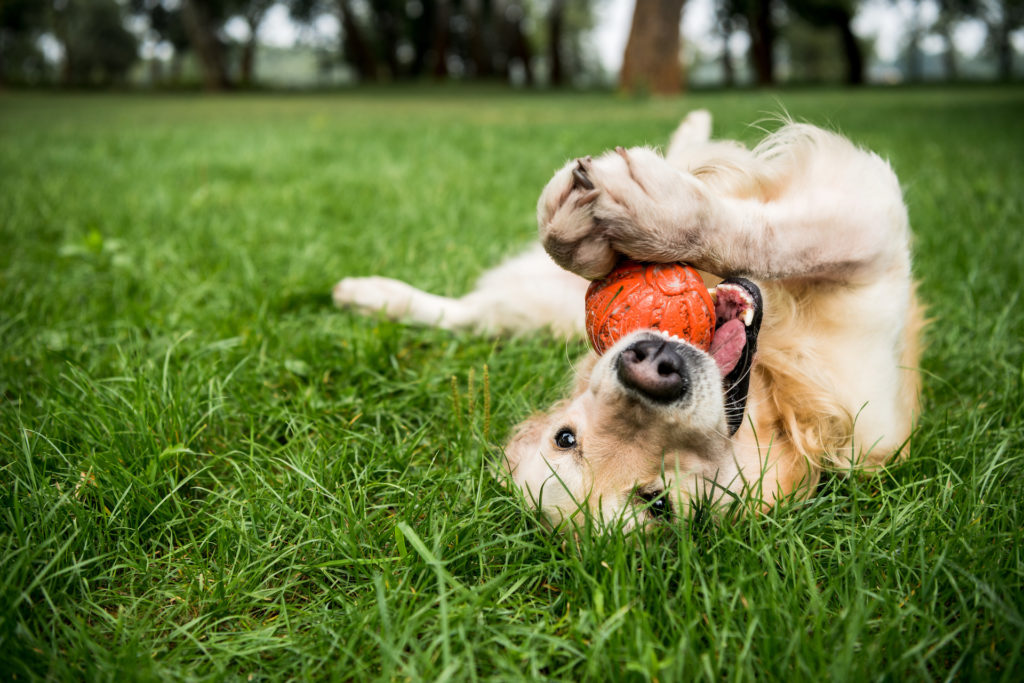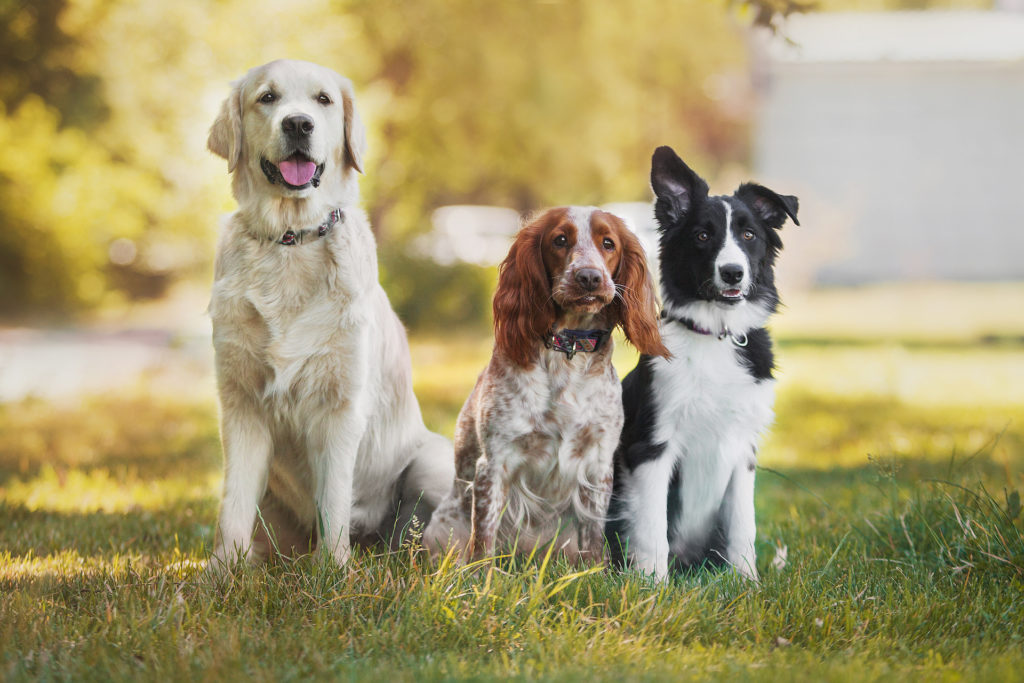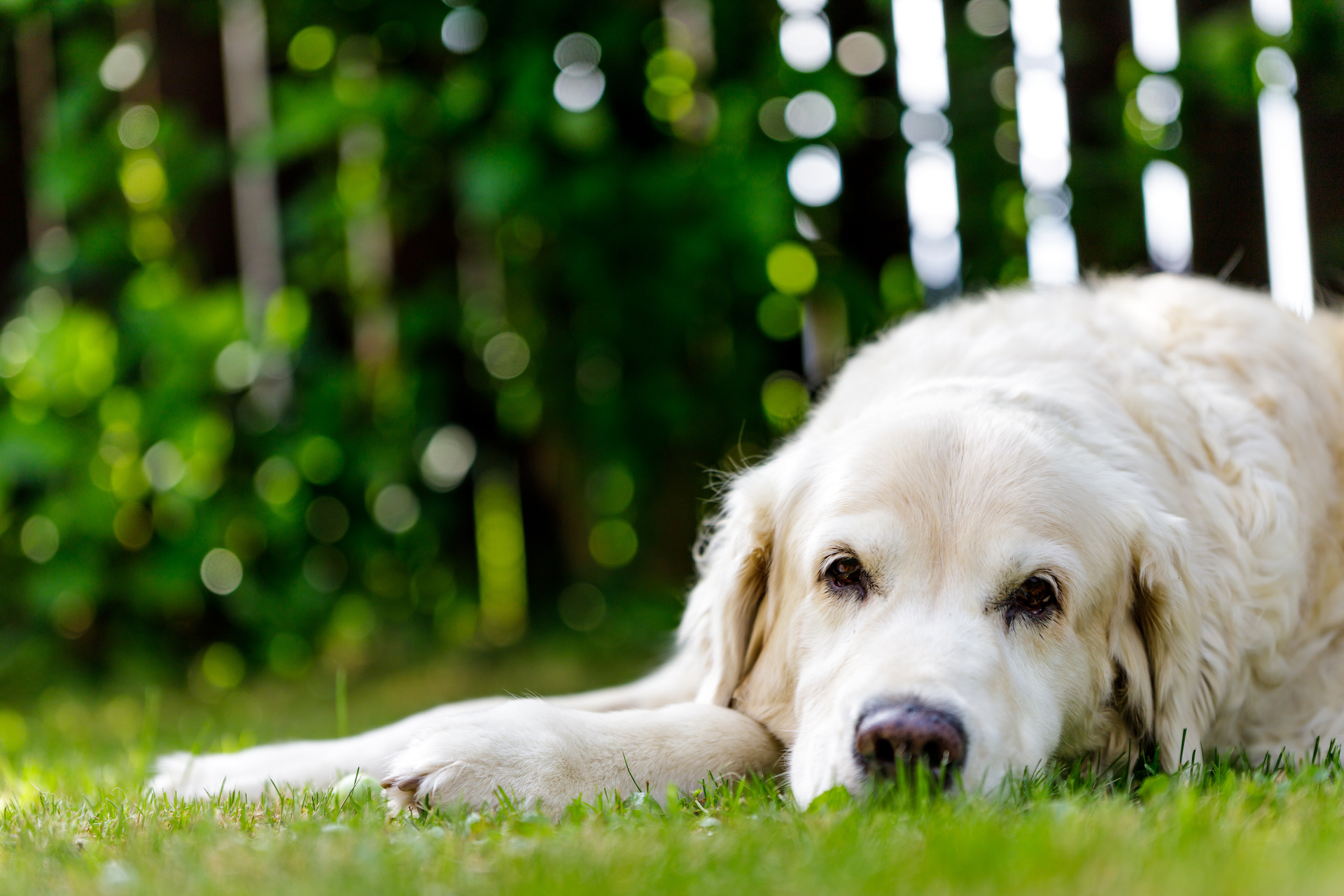A healthy Golden Retriever’s life span is 10-12 years on average. In some cases, this will, unfortunately, be less, while in others you’ll be blessed with extra time to spend with your Golden Retriever.
There are some notable exceptions to this average life expectancy. For instance, Augie turned 20 in April 2020 and she was the oldest known Golden Retriever before her passing on 31st March 2021.
Read on for more details – including how long you should expect a Golden Retriever to live and tips on keeping your Golden Retriever healthy.
A Golden Retriever’s Lifespan: What to Expect
It’s lovely to know that these gorgeous golden beasts can live such long lives, but it’s unfortunately not that common.
Golden Retrievers are prone to many illnesses (such as cancer) that can significantly shorten their lives. In fact, ongoing research from the Morris Foundation concluded that cancer claimed the lives of around 60% of American Golden Retrievers. Another study in 2010 also found that approximately 38.8% of European Golden Retrievers died from cancer.
Sadly, we lost our beautiful golden girl when she was just four years old due to multiple cancerous growths on her liver and spleen. By the time we knew that anything was amiss, she was already too far gone to save. But she had six other littermates – all of which remain in seemingly good health.
Factors That Affect a Golden Retriever’s Lifespan
There are a few reasons why Golden Retrievers might have a shorter lifespan. As well as cancer (mentioned above) there are some other factors:
- Health conditions: Heart disease, hyperthyroidism, gastrointestinal illness, urinary diseases, and epilepsy.
- Genetics: Golden Retrievers can inherit health conditions that their lineage had. All the health conditions listed above and the many types of cancer can be passed down their family line.
- Environmental factors: Toxins, radiation, and even the sun can affect your Golden Retriever. There isn’t much you can do apart from changing where you live to avoid certain factors.
How to Work Out How Old Your Golden Retriever Is

If you don’t have access to their date of birth, and aside from asking a vet, there are a few things you can do to get a rough idea of your Golden Retriever’s age:
- Check their teeth: A Golden Retriever under seven months old won’t have a full set of teeth. By the age of three, their teeth will lose their clean white colour. When they get past five, their teeth will be stained and dull, most likely with some cavities.
- Fur colour: Once they reach five or six, their distinctive golden coat will start to get some white or grey. The older they get, the more white and grey fur they’ll have.
- Body shape: This is harder to determine, but adults will be bigger than puppies and older Golden Retrievers will probably have more fat and muscle.
You can also gauge a rough idea based on their energy levels – young Golden Retrievers tend to be more energetic and playful. But this isn’t foolproof – plenty of older Goldens are just as excitable and energetic.
Older dogs also develop issues with their hearing and sight, which don’t usually affect pups.
Keeping Your Golden Retriever Healthy
Our golden girl was just unlucky. You can’t predict how much time they’ll be blessed with. Sometimes you’ll have to say a final goodbye sooner than you’d expected, and there isn’t anything you can do to change it.
However, there are a few things that you can do to give them the best chance of a long and healthy life:
- Choose good food for them: Do your research on what companies put into their products. It’s common to see a lot of unhealthy fillers added to pet food. This website seems to have a lot of information about most dog foods currently on the market.
- Exercise: This is one of the most critical things you need to do to keep your Golden fit. Staying active helps to keep their heart, lungs, and circulation healthy. Adults need at least two hours of exercise per day.
- Brush their teeth: Oral hygiene is important for dogs. Regular tooth brushing can help avoid tooth decay (which leads to tooth extraction), as well as more serious issues such as heart disease.
- Hygiene: Regularly cleaning your Golden Retriever’s ears and coat will help prevent ear infections, fleas, and ticks from causing your pet trouble. It can also prevent bacteria from entering their bloodstream and damaging internal organs.
- No scraps: Don’t get me wrong – an occasional treat is fine. However, you should avoid regularly feeding your Golden Retriever scraps and leftovers. It not only encourages weight gain and ill health, but some human foods really aren’t that great for our canine friends.
- Be aware of changes: You know your pooch better than anyone else. Consult your vet if you notice any changes in behaviour or something that just doesn’t sit quite right with you. It’s what they’re there for and they’ll notice little things that you might overlook.
- Get regular vet check-ups: Staying up to date on vaccinations and having your vet check your Golden Retriever over means that they could pick up on problems sooner. You should do this even if your pet is in good health, early diagnosis is key here.
- Neuter your Golden Retriever: Getting your Golden neutered can drastically reduce the risk of certain cancers. If you aren’t planning on breeding your pet, this is something you should consider.
Golden Retriever Lifespan Compared

The general rule of thumb is that the larger the dog breed, the shorter their lifespan typically is.
There are always exceptions to every rule, but – looking at the table – a Chihuahua having the longest lifespan and a Bernese Mountain Dog having the shortest is true to form.
| Breed of Dog: | Life Expectancy (in years): |
| Chihuahua | 15 – 17 |
| Pomeranian | 14 – 16 |
| Cocker Spaniel | 13 – 15 |
| Poodle | 12 – 15 |
| Golden Retriever | 10 – 12 |
| Newfoundland | 10 – 12 |
| Irish Wolfhound | 8 – 10 |
| Bernese Mountain Dog | 8 – 10 |
What Age Are Golden Retrievers Considered Seniors?

Once a Golden Retriever passes seven years old, they’re considered seniors. They might have a little less energy and have grey or white fur – especially around their face and muzzle.
They might also develop clouded eyes, their hearing deteriorates, and their weight might change. There’s also a chance of issues developing such as urinary incontinence, and arthritis. In some cases, this is when they’ll struggle with diseases and cancers.
Keep a close eye on your Golden Retriever as they get older. Watch out to make sure they’re eating, drinking, and not in any pain. Make sure that you visit the vet for regular checkups and try to deal with problems as early as you can.
How Does a Golden Retriever’s Lifespan Compare to a Human?

A lot of people think that one human year is the equivalent of seven dog years – but this is a myth!
According to American Kennel Club, you can calculate it like this for a medium-sized dog breed (like Golden Retrievers):
- The first year of their life is like 15 human years.
- The second year of their life is like 9 human years.
- Then, every one dog year after that is like 5 human years.
So, after just two years, your Golden Retriever is in their mid-twenties! And by year 10, your Golden Retriever would be the equivalent of 64 human years old.
